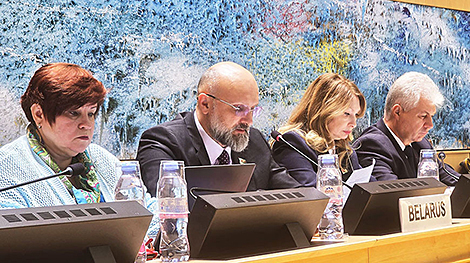Opinions & Interviews
MFA: Belarus calls on EU to return to dialogue, to lift all illegal restrictions

MINSK, 3 November (BelTA) - Belarus calls on the EU to return to the path of dialogue and lift all illegal restrictions, Belarusian Deputy Minister of Foreign Affairs Igor Sekreta said during the Universal Periodic Review on Human Rights in Geneva, BelTA has learned.
The Belarusian delegation included the commissioner for religious and ethnic affairs and representatives from the General Prosecutor's Office, the National Statistical Committee, the Ministry of Foreign Affairs, and the Ministries of Information, Justice, and Labor and Social Security.
Igor Sekreta emphasized that Belarus is a welfare state where people, their interests, and needs are the central focus. The country has a well-developed system of specialized state-public institutions for the protection and promotion of various categories of human rights. “The social security system justifiably remains the hallmark of our country. Thanks to the consistent efforts of the state, a sustainable level of social security of people has been ensured,” Igor Sekreta said. “An accessible and effective healthcare system is a top priority of state policy. In Belarus, every citizen, I emphasize, every citizen regardless of their wealth or social status, has the opportunity to receive any type of medical care free of charge, including the most high-tech procedures. This is something that not every country, even in Europe, can boast of.”
He also highlighted the availability of quality and affordable education in Belarus, decent living conditions for families, including those with children, and broad opportunities for the youth to develop their spiritual, intellectual, and physical potential.
“Belarus implements a consistent policy to increase household income and ensure social guarantees for the most vulnerable categories of citizens. Over the past five years, the real disposable household income has increased by almost 15%,” Igor Sekreta noted. There is a steady decline in the unemployment rate, which, according to the International Labor Organization methodology, stood at 3.1% in 2024, which was one of the lowest rates since observations began.
The deputy minister emphasized that the effectiveness and validity of the strategy chosen by Belarus are confirmed by international ranking data and cited some facts. “Belarus has made great progress towards the Sustainable Development Goals which is assessed at over 80%. Belarus ranks 32nd out of 167 states. We consistently maintain our position as a country with a very high level of development, ranking 65th among 193 countries in the Global Human Development Index. In the Gender Inequality Index, Belarus ranks 27th out of 172 countries. According to the World Economic Forum, gender equality in Belarus has reached 73.6%, a result better than 94 other countries worldwide,” he said.
Belarus has one of the lowest rates of maternal, infant, and child mortality in the world and is ranked among the top 25 countries for motherhood. “These indicators could have been even higher if not for the unilateral coercive measures arbitrarily imposed on Belarus by a number of Western countries. The policy of sanction pressure promoted by these countries violates the economic and social rights not only of Belarusian citizens but also of citizens in many other countries. For example, the ban on the use of Belarusian airspace makes civil aviation unsafe and calls the European Union's 'Green Deal' into question. The West has closed most (and in some cases all such as by Lithuania) land border crossings,” Igor Sekreta emphasized. He stated that as a result of this abuse of geographical position by Belarus' western neighbors, humanitarian and economic losses are evident.
Nevertheless, Belarus has managed to reorient its economy and build a system that ensures its citizens a decent quality of life. “At the same time, we call on the EU to return to the path of dialogue and lift all illegal restrictions, as such actions have no place in the modern civilized world,” the Belarusian deputy minister of foreign affairs said.
“Belarus intends to continue upholding high human rights standards aimed at social protection, economic stability, and political unity for its citizens," Igor Sekreta added.







 print version
print version make home page
make home page add to bookmarks
add to bookmarks

